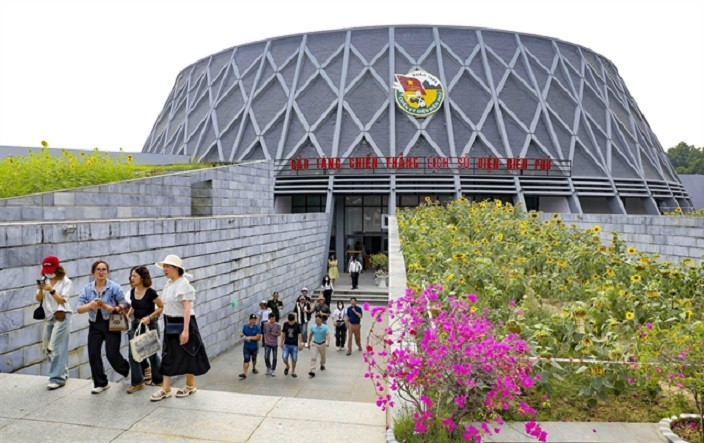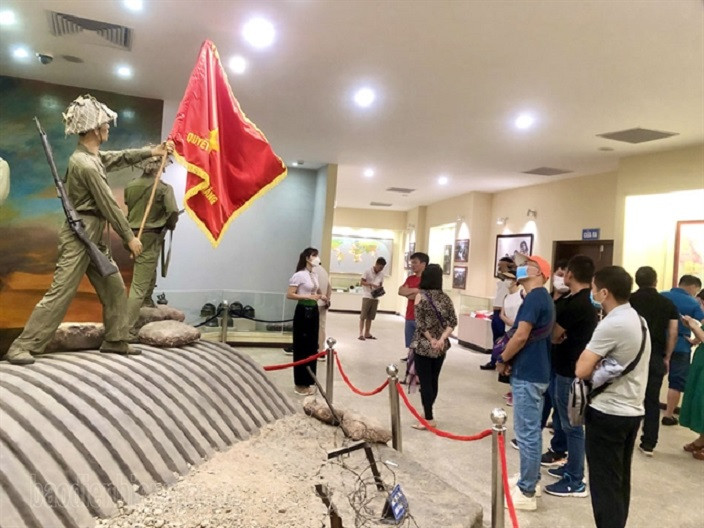
Điện Biên Phủ Museum has become a must-visit site for tourists to the north-western province of Điện Biên, as the locality is actively preparing for the 70th anniversary of the Điện Biên Phủ battle victory (May 7, 1954-2024) and opening the Visit Vietnam Year – Điện Biên 2024.
On March 13, 1954, the Vietnam People's Army launched the first attack on the French heavily fortified base at Điện Biên Phủ, starting a 56-day historic campaign whose victory on May 7 directly led to the signing of the Geneva Accords, ending the war and restoring peace in Indochina.
The museum, located on Võ Nguyên Giáp Street in Điện Biên Phủ City, houses thousands of documents and artefacts associated with Việt Nam’s historic victory over French troops in 1954, which “resounded across the five continents and shook the globe”.
The museum was inaugurated in 2014 to commemorate the 60th anniversary of the Điện Biên Phủ Victory. It is a modern architectural work with exterior design mimicking the shape of the iconic camouflage bamboo hats worn by Vietnamese soldiers in the war of resistance against the French in the first Indochina war (1946-54).
The exhibition area is arranged on the first floor of the museum on a space of 1,250sq.m. It houses nearly 1,000 documents, artifacts, photographs and maps, making it a modern exhibition space.

The highlight of the museum is a large panoramic artwork, one of the world’s largest war-themed oil paintings, depicting the Điện Biên Phủ battlefield at different times from late 1953 to May 7, 1954.
The extraordinary circular oil on canvas is 132m long, 20.5m high and 42m in diameter. Featuring 4,500 characters, the artwork depicts the entire army going to battle, the opening combat at Him Lam Hill, the A1 Hill battle, and the final triumph.
It was created by nearly 200 painters, architects, musicians and technicians, starting in November 2019 and completed in May 2022.
The panoramic painting, together with other exhibits, enables visitors to immerse themselves in the historical atmosphere of the glorious victory.
“A visit to Điện Biên Phủ Museum provides an opportunity to hear and witness the intense battles fought by Vietnamese soldiers against the French colonialists that led to the glorious victory that shook the world,” said Huỳnh Minh Nhật, a tourist from HCM City.
“I was deeply moved and proud of the previous generations. They lived, fought and sacrificed their youth to defend the country so that the present generation could live in peace,” he added.
Vũ Thị Tuyết Nga, director of the museum, said the unit has mobilised all human resources to meet tourists' demand.
Attention has been paid to collecting and preserving war artefacts, contributing to popularising the country’s tradition of resilience and solidarity in resisting foreign invaders, not only for Vietnamese people but also peace lovers around the world, she added.
The museum stands as a driving force for Điện Biên to develop historical tourism into a leading economic sector.
Điện Biên expects to welcome 1.3 million visitors and earn some VNĐ 2.2 trillion from tourism this year when the province hosts the National Tourism Year. These numbers are expected to reach more than 1.45 million and VNĐ2.38 trillion, respectively, in 2025. VNS